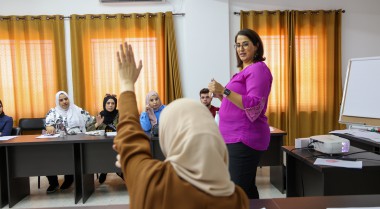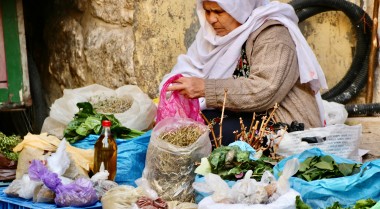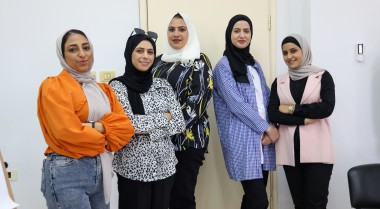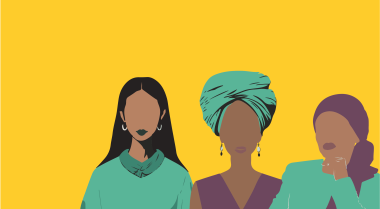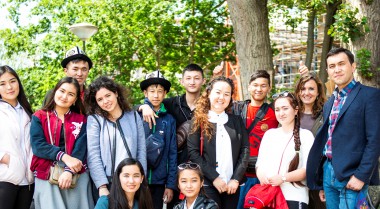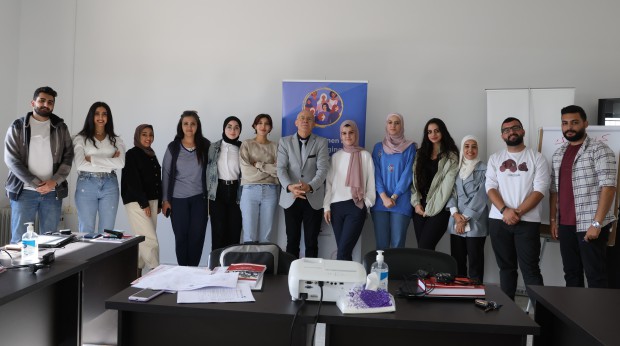
Palestinian Women Lead the Way
Starting in April 2025, Middle East Nonviolence and Democracy (MEND) and its partners in the Occupied Palestinian Territories (OPT), the Palestinian Centre for Peace and Democracy (PCPD) and Haider Abdel Shafi Center for Culture & Development (HCCD), will run a six-month project across the Gaza Strip, Jerusalem, West Bank, and Egypt to support and amplify Palestinian women’s voices to take an active role in peacebuilding and reconciliation. Through training in nonviolence, conflict resolution, human rights, and UNSCR 1325, as well as participatory video workshops, women will advance skills to advocate for their inclusion in peace processes. The project will co-create a roadmap to reconciliation and establish a sustainable, women-led network to continue advocating for non-violent conflict resolution and reconciliation efforts.
The ongoing war on the Gaza Strip since October 7, 2023, combined with decades of occupation, political divisions, and constant violence, has torn Palestinian society apart. The urgency for healing and reconciliation has never been greater. The humanitarian crisis in the Gaza Strip left entire communities displaced, vital infrastructure destroyed, and people struggling to survive and rebuild their lives.
At the same time, the internal Palestinian divide, stemming from political and territorial fragmentation between the West Bank and the Gaza Strip, splits between major political factions, and governance disputes, weakens the social fabric and diminishes the collective ability to address both internal and external conflicts. In the West Bank, escalating Israeli settlement activities, forced home demolitions, and settler violence with impunity are further intensifying displacement and insecurity.
Within this reality, Palestinian women, in particular, face unimaginable hardships, enduring increased violence, losing their livelihoods, and having limited access to essential services such as shelter, health, food, water and sanitation. Compounded by entrenched patriarchal norms, these challenges systematically marginalise women from formal decision-making spaces, including political leadership roles and peace negotiations, where their perspectives are crucial for creating lasting, inclusive solutions.
Nevertheless, women have consistently been at the forefront of grassroots peacebuilding through advocacy, service provision, facilitating local dialogues and capacity building. This project builds on their community leadership by amplifying their voices and integrating their perspectives into formal peace dialogues, fostering a sustainable, women-led movement for reconciliation.
From Skills to Action: Women Shaping Palestine’s Reconciliation Roadmap
Building on previous efforts, this initiative strengthens Palestinian women’s leadership in reconciliation efforts. Concretely,
- Women from the Gaza Strip, Jerusalem, the West Bank and displaced Palestinian communities in Egypt participate in training sessions on nonviolence, conflict resolution, UNSCR 1325, and human rights. These trainings support youth and women with the tools to lead nonviolent conflict resolution and influence the peace agenda. Through participatory video workshops and peer-to-peer learning, women document personal stories and directly engage with policymakers to advocate for including their voices and perspectives in the reconciliation discussions.
- Palestinian young women leaders, community groups, and decision-makers come together in collaborative workshops and strategic meetings to co-develop a national Roadmap to Reconciliation. This roadmap will serve as a key advocacy tool, embedding women’s perspectives in internal reconciliation efforts and the formal peace processes.
- The initiative culminates in the formation of a women-led network dedicated to advancing reconciliation efforts. This women-led network will be mobilised to engage stakeholders, share recommendations, and amplify women’s voices through social media campaigns and public events. By highlighting the critical role of young women in peacebuilding, this project fosters a sustainable women-led movement for reconciliation and unity.
A Consortium’s Collective Action for Peace
Three Palestinian civil society organisations, Middle East Nonviolence and Democracy (MEND), Palestinian Centre for Peace and Democracy (PCPD) and Haider Abdel Shafi Center for Culture & Development (HCCD), have come together as a consortium bringing together complementary expertise to accelerate women’s leadership in peacebuilding across the region. MEND leads the consortium focusing on nonviolence training and participatory video methodologies. PCPD contributes its expertise in political engagement and civil society training, mainly through UNSCR 1325, while HCCD focuses on advocating for women's rights, youth empowerment, and active participation in peace processes.
Together, the consortium works across the Gaza Strip, Jerusalem, West Bank, and Egypt to support women as central agents of change in a time of increasing violence and fragmentation of society. Their collective action helps build a platform for national reconciliation (roadmap) that fosters collaboration among diverse Palestinian stakeholders, pushing for national unity for peace.
Sustaining Impact: A Women-Led Movement for Peace
Sustainable peace goes beyond temporary engagement; it requires structural change that empowers women to lead at every level of the peace process. This project is designed to support immediate reconciliation efforts and lay the foundation for a lasting women-led movement for peace in Palestine. It ensures that women's leadership in peacebuilding becomes institutionalised by equipping women with the tools, networks, and platforms necessary to influence policy. The initiative aims to create a lasting network led by women, reinforcing their continued role in shaping Palestinian society’s future.
This initiative offers a sustainable and inclusive path toward national unity by placing Palestinian young women and male allies at the heart of the reconciliation process. Through the collective action of the OPT consortium and its partners, this initiative will amplify women’s roles, ensuring they have the space to lead and shape a peaceful future.
About the UN Women’s Peace and Humanitarian Fund’s Rapid Response Window
The Rapid Response Window for Women’s Participation in Peace Processes and the Implementation of Peace Agreements is a mechanism under the United Nations Women's Peace and Humanitarian Fund (WPHF) that provides targeted, short-term support to increase women’s participation in peace processes and the implementation of peace agreements. As a flexible financing tool, the RRW plays a vital role in enabling agile, women-led peacebuilding initiatives—helping local women and young women engage meaningfully across different levels and with a range of stakeholders. Its adaptability is essential for responding to crises, preventing conflict, and seizing critical peacebuilding opportunities in rapidly changing contexts.
